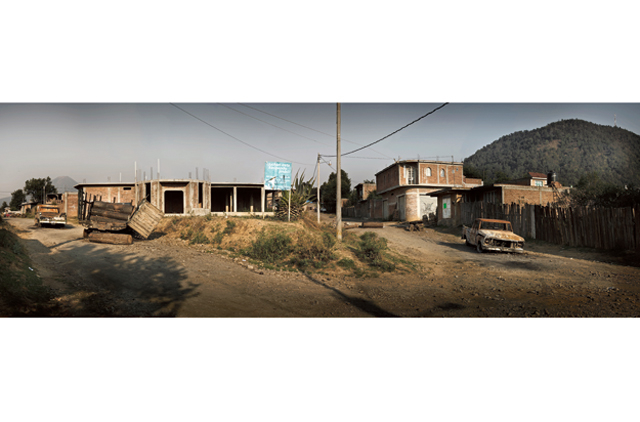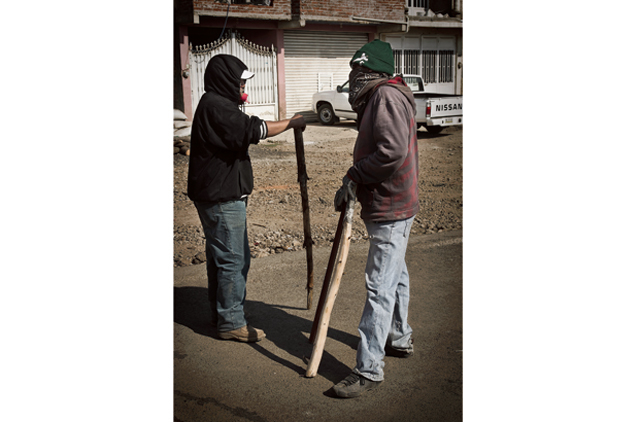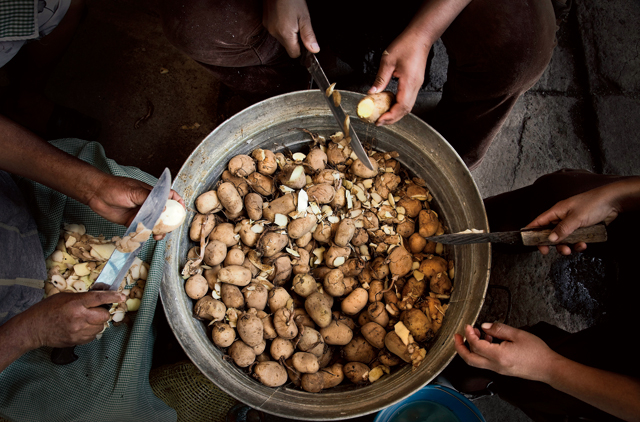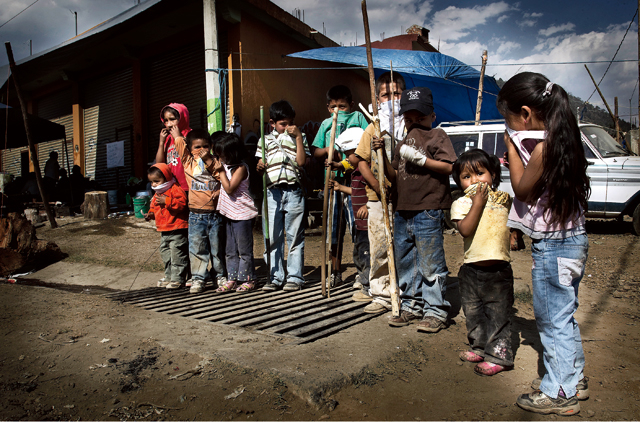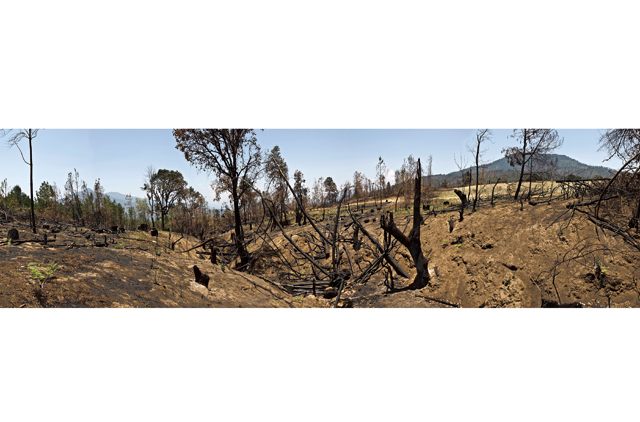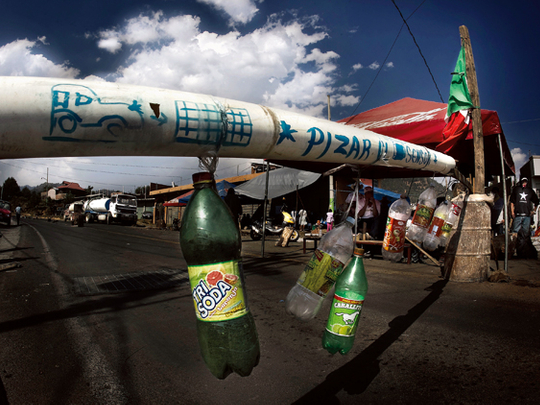
Since last April, the residents of Cherán, a small mountain town in the Mexican state of Michoacán, have been fighting an uphill battle against illegal loggers backed by heavily armed members of the local crime cartel, a corrupt police force and inefficient local politicians.
Sixteen thousand men, women and children of this indigenous community face increasing violence, which has been spreading throughout the country since Mexico's President Felipe Calderón launched an anti-drug war in 2006 - a war that has left at least 37,000 people dead.
The residents of Cherán, however, after years of sustained abuse and an ecocide of more than 40,000 acres of forest, have decided to take justice and their future into their own hands. Armed mainly with stones, sticks and an extraordinary amount of courage and resilience, they have decided to fight back against organised crime, setting a nationwide example.
With its mountainous landscape full of different tree species, the state of Michoacán has always been an important supplier of timber. Legally, about one million cubic metres are extracted every year. Although it's illegal, the state technically has enough forest to extract thirteen million cubic metres of timber a year. The state has approximately 3,000 illegal sawmills and 2,500 are located in the state's Purépechan heartland. Cherán's indigenous Purépecha community survives mainly on the collection of resin and by logging.
The presence of illegal loggers is not new to the Cherán community. Most of the residents are aware that the loggers come from neighbouring towns. But two years ago, this was a clandestine activity. Loggers would drive their trucks up the mountain to cut trees and drive to the illegal sawmill after paying law enforcement a previously agreed bribe for allowing their activity.
When the farmers and resin collectors of Cherán, which lies 400km west of the country's capital, Mexico City, eventually confronted the loggers, they were not treated kindly.
About two years ago, the local organised crime cartel offered the illegal loggers protection. After paying a fee, they were free to do as they pleased while the cartel would take care of police and members of the Purépecha community who complained. People who went looking for illegal loggers after hearing the sound of their chainsaws were warned and scared off with gun shots from automatic rifles. Later, nine community members were found dead and several others kidnapped for ransom. Four of those kidnapped are still missing.
Emboldened by their new protection, the illegal loggers began driving dozens of trucks along the town's main road in plain sight of residents. The community could only watch helplessly.
On April 15, 2011 the Purépecha community decided they had been humiliated and taken advantage of for long enough and took action. A mob of about 200 people armed themselves with bats and stones and ambushed several loaded trucks. They set the trucks on fire once they had pulled the loggers out. One trucker, armed with a gun, shot a protesting resident in the eye. The injured man remains in a coma at a nearby hospital. The captured truck drivers and illegal loggers were not treated with lenience but a week later, after being interrogated, the people of the town handed them over to the federal police.
If the Purépechans thought this was the end of the matter, they were mistaken. On April 27, 2011, in what was undoubtedly an act of revenge, illegal loggers shot and killed two Cherán residents who were patrolling the town's perimeter.
Following the incident, the community evicted the town's mayor and corrupt police force and began building over 200 barricades throughout the town, preventing vehicle access to most roads.
More than ten burnt-out trucks were towed and placed along the main streets as a reminder of the cause and to warn illegal loggers and members of organised crime groups. No one was allowed to leave or enter Cherán without identifying themselves at the main barricade. Law enforcement officials and politicians were not welcome. Only supply trucks, non-government organisations and national and international media were allowed in.
Children, together with their mothers, now occupy the barricades during the day. At night — the most dangerous shift — the men sit alert through the cold and rain. Like a well-greased machine, 16,000 residents have organised themselves into groups that control one of the four barrios or sectors that make up the town.
Tired of political inefficiency and corruption, the residents of Cherán have also formed their own government loosely based on tradition and custom.
With the help of a lawyer, they are negotiating more security from the state and federal government. They hope this will include the continuous patrol of the town's perimeter by the Mexican army, the only forces they trust. The federal police is stationed less than 2km away from town but local residents remain suspicious of them.
Several NGOs like Amnesty International have visited the town and issued recommendations to the Mexican government. But the authorities have so far shown little interest in resolving the situation.
Meanwhile, the people live off food donations from all over Mexico that are delivered to Cherán's main church and distributed. The 20 schools in town are empty. Children run through the streets helping their parents and holding banners and protest signs.
A town like Cherán wanting to develop its own security measures and to implement their own, more accountable government is nothing new to the Mexican government that had to deal with the rebellion of the Zapatistas. The result of that rebellion was the signing of the San Andres Accords on February 16, 1996, where autonomy and rights were granted to the indigenous populations of Mexico.
But former President Ernesto Zedillo ignored the agreements and further militarised the conflict area in the state of Chiapas.
As a member of the ILO (International Labour Organisation), Mexico is required to respect the C169 Indigenous and Tribal Peoples Convention of 1989 where further rights and autonomy are granted to the country's indigenous communities.
Even though these conventions and accords are in harmony with the Mexican Constitution, the federal government is slow in implementing and enforcing them. Instead the government prefers that each state internally deal with problems that may arise.
While the brave but beleaguered residents of Cherán have set an example of courage, community spirit and bravery to Mexico's most marginalised people, their fight goes on.


